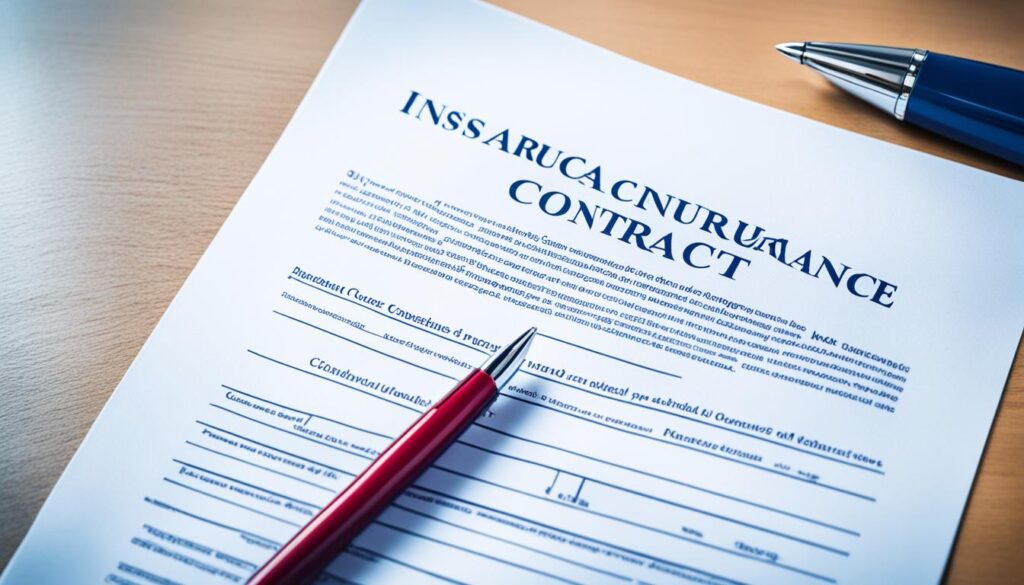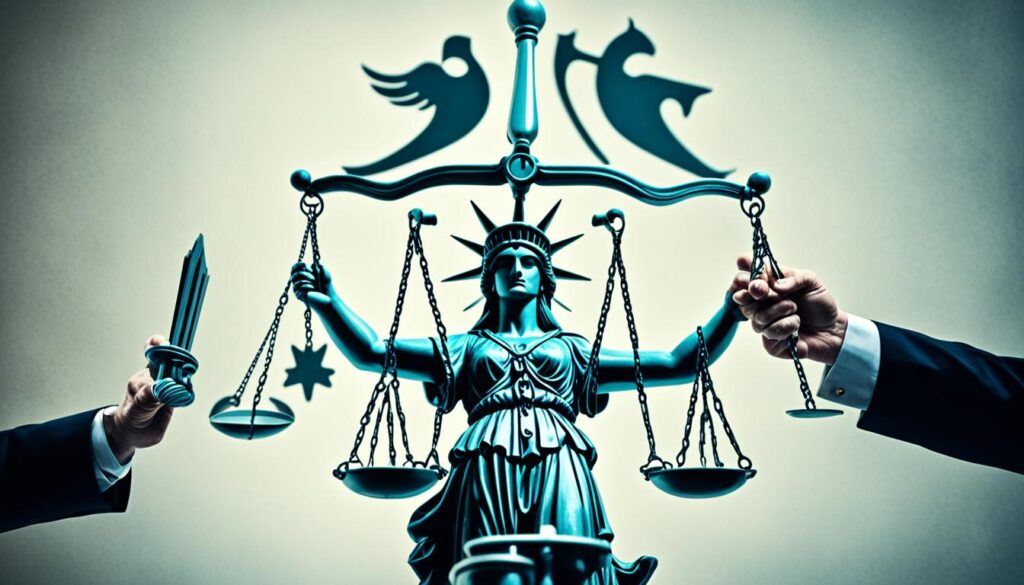Have you ever wondered how to file a personal injury lawsuit? This could be after a car accident, a slip and fall, or at work. Knowing the steps to take for a personal injury claim is crucial. It helps protect your rights and get the compensation you deserve.
In this guide, we’ll cover everything about filing a personal injury lawsuit. We’ll tell you the deadline for filing, who and where to sue. We aim to simplify this complex and overwhelming process for you. Are you ready to learn about personal injury lawsuits and prepare for your case? Let’s dive in!

Key Takeaways:
- Understanding the personal injury claim process is crucial when filing a lawsuit.
- Knowing the deadline to sue and the types of personal injury cases can help you determine the appropriate course of action.
- Identifying the responsible party and choosing the right venue for the lawsuit are key considerations.
- Checking insurance coverage and calculating damages are important steps in preparing your case.
- Gathering evidence and consulting with a lawyer are highly recommended for a successful personal injury lawsuit.
Types of Personal Injury Cases
Personal injury cases cover various situations like car accidents, slip and falls, and injuries at work. The injured person starts a lawsuit against the one who caused harm. This could be due to carelessness or doing it on purpose.
Car accidents are among the top reasons for personal injury claims. They might happen because someone drives too fast or is under the influence. The injuries from car accidents can be anywhere from small to life-threatening.
“Car accidents can be traumatic experiences that often result in devastating injuries. It is crucial to gather evidence, such as photographs of the accident scene and witness statements, to support your case.”
Slip and fall cases are also frequent. They often happen due to dangerous conditions like wet floors or bad upkeep. These accidents might cause injuries such as broken bones, sprains, or even concussions.
Workplace injuries occur during work due to unsafe conditions or accidents with machinery. Injured workers may get compensation for their medical costs, lost income, and more.
Knowing about different personal injury cases helps in taking the right legal steps. If you’re in a car accident, a slip and fall, or a workplace incident, talking to a lawyer is key. They guide you through the legal steps and help get the compensation you need.
Keep reading to find out about lawsuit deadlines, identifying who to sue, figuring out damages, collecting evidence, and why talking to a lawyer is vital in personal injury claims.
Deadline to Sue: Statute of Limitations
The statute of limitations sets the timeframe to file a personal injury lawsuit. It defines when you must start your case. Usually, you have 2 years from the injury date to sue. This period can change based on where the case is and its details.
Different cases may have varied time limits. Suing the government, for instance, might have a shorter period. Seeking advice from a personal injury attorney is key. They can explain the time limits for your particular case.
Why does the statute of limitations matter? If you miss the deadline, your case could be thrown out. After the time limit ends, you can’t seek money for your injuries, no matter how good your case is.
Disclaimer: The information provided here is for general knowledge and should not be considered legal advice. Consult with a qualified attorney for guidance specific to your situation.
Prevent Dismissal – File Within the Time Limits
To avoid having your case dismissed, file your lawsuit on time. Doing so makes sure your lawsuit is seen as valid. It keeps your right to ask for injury compensation.
Find out the specific time limits in your area by talking to a personal injury lawyer. They can make sure you file your case correctly and on time. This helps protect your interests and can help you win.
Seek Legal Advice for Time-Sensitive Cases
In time-sensitive personal injury cases, getting legal advice quickly is crucial. A skilled lawyer will know your case’s time limit. They’ll help you through the claims process.
A personal injury attorney can do more than just file on time. They collect evidence, talk to insurers, and fight for you in court. Their law knowledge can greatly help your case.
| Key Points |
|---|
| Statute of limitations sets a deadline for filing a personal injury lawsuit. |
| Deadline to sue is usually within 2 years from the date of the injury. |
| Time limits for suing may vary depending on the jurisdiction and case type. |
| Failure to file within the statute of limitations can result in dismissal of the case. |
| Consult with a personal injury attorney to understand the specific deadlines applicable to your case. |

Determining who to Sue
Finding out who is to blame in personal injury cases can be hard. People often think about suing more than one person. It’s tough to choose the right person or company to sue for a better chance of winning.
It’s critical to think about everyone who played a part in the injury when you’re suing. This might be the person who caused it, the landowner, or an employer if it happened at work. An injury can come from several sources, and it’s key to hold them all accountable.
Deciding who to sue takes a close look at what happened. Responsible for injury parties can vary from careless people to businesses that didn’t keep things safe. Sometimes, you might need to sue a few people to make sure everyone responsible is taken to court.
Getting help from a personal injury lawyer can be really helpful. They can look into the injury, pinpoint who’s at fault, and figure out the best legal steps. They guide you in figuring out who to sue, making sure your case is strong.
A lawyer will carefully check all the evidence and use their knowledge to support your claim. By suing everyone involved, you better your chances of getting compensated for your injuries and losses.

Thomas Anderson, Personal Injury Attorney
“It’s key to think about everyone who might have led to your injury when suing. By suing several people, you better your chances of getting fully compensated for your losses.”
| Key Considerations when Determining who to Sue: |
|---|
| 1. Thoroughly examine the circumstances of the injury and its causes. |
| 2. Identify all individuals or entities that may be responsible for the injury. |
| 3. Determine the level of involvement and liability of each potential defendant. |
| 4. Consult with a personal injury attorney to discuss your options and gather legal advice. |
| 5. Build a strong case against all responsible parties to maximize your chances of obtaining compensation. |
Choosing the Right Venue
When you’re thinking about a personal injury lawsuit, finding the right place to file it is key. This specific place is called the venue. It’s where your case will be heard. Picking the right venue is important for a fair outcome.
There are a few main factors that determine the best venue for your case. Usually, you can file the lawsuit where:
- Where the injury occurred: If the injury happened in a specific city or state, you can often file there. This makes sure the court can oversee the case. It also means the trial is near where everything happened.
- Where the defendant lives: You might also file where the defendant lives. This is usual if the defendant is a person and not a company. It can make things easier for everyone involved.
- Where the defendant does business: If the defendant is a company, filing where they do business is an option. This can be a smart move. The laws in that area might give you advantages.
Choosing the right place to sue is very important. Laws and rules can be different in each area. They can change how your case turns out. Talking to a personal injury lawyer can really help you decide the best venue for your case.

Factors to Consider in Choosing the Right Venue
| Factors | Considerations |
|---|---|
| Location of the injury | Choose the location where the injury happened. This helps with convenience and ease for all involved. |
| Defendant’s residence | Filing where the defendant lives can make the process easier and more favorable. |
| Defendant’s business location | Choosing to file where the defendant’s business is located might give you strategic benefits. |
| Applicable laws and regulations | Think about how the area’s specific laws and rules could affect your lawsuit’s result. |
Understanding Insurance Coverage
Before you file a personal injury lawsuit, knowing about insurance coverage is key. Insurance companies protect you financially in case of injury. Talking to your insurance company and checking your policy tells you how covered you are and if you need to sue.
Personal injury cases often come with high medical bills. Insurance can help by covering some or all of these costs. This way, you might get compensation for treatments without going to court.
Liability is a big deal in personal injury cases. It means whoever caused the injury might have to pay. Insurance can cover these costs, including legal fees and damages, if you’re sued successfully.
It’s vital to know how much your insurance covers before suing. Talk to your insurance company to see if your injuries and costs are covered. This can save time, money, and stress.
But remember, insurance might not cover everything. Some injuries or situations won’t be under your policy, pushing you towards legal action. Getting advice from a skilled personal injury lawyer can shed light on your insurance and legal choices.
Knowing your insurance can guide your decision on whether to file a lawsuit. Insurance impacts your case’s result and the compensation you might get. Always review your policy’s details and get professional advice for the best outcome for your injury.

Overview of Insurance Coverage in Personal Injury Cases
| Type of Insurance | Coverage Details |
|---|---|
| Auto Insurance | May provide coverage for medical expenses, lost wages, property damage, and liability in car accident cases. |
| Homeowners/Renters Insurance | May offer liability coverage if someone is injured on the insured property. |
| Employers’ Liability Insurance | May cover workplace injuries and related medical expenses. |
| Medical Malpractice Insurance | Provides coverage for healthcare professionals in the event of medical negligence claims. |
| General Liability Insurance | Offers coverage for businesses and individuals in the event of accidents or injuries. |
Elements of a Cause of Action
A cause of action is what you need to sue for damages in a personal injury case. To win, the injured party must prove certain parts of their claim. These parts may include negligence or battery, among other theories. Defendants need to know these parts to defend themselves well.
Now, let’s look at common parts of a cause of action:
Negligence
Negligence is often claimed in personal injury lawsuits. It happens when someone doesn’t take enough care and hurts another person. To win a negligence case, four things must be proven:
- The defendant had a duty to be careful with the plaintiff
- That care was not given
- The plaintiff was hurt or suffered a loss
- The lack of care directly caused the injury or loss
Battery
Battery is a deliberate act that causes harm or offensive contact without permission. To prove battery, the injured party must show:
- The defendant meant to cause contact
- The contact was harmful or offensive
- There was no consent from the person harmed
These examples only scratch the surface of what might lead to a personal injury lawsuit. Talking to a skilled personal injury lawyer is crucial. They can look at your case’s details and figure out the right cause of action.

Calculating Damages
When filing a personal injury lawsuit, it’s vital to think about damages. Damages help cover the harm from the injury.
First, we look at how bad the harm is. We examine the injuries, how they change daily life, and any ongoing medical care. Costs from the injury, like hospital bills and rehab fees, are included.
Lost wages are key too. If the injury stopped you from working, you should count the lost income. You might also need to consider future earnings if you can’t earn as much anymore.
Emotional distress counts in personal injury cases. It’s hard to put a price on things like anxiety and depression, but it’s part of the compensation. Emotional distress covers the injury’s mental and emotional effects.
Every personal injury case is different. The damages vary by situation. Working with a good lawyer ensures you calculate all possible damages.

| Types of Damages | Description |
|---|---|
| Medical Expenses | Includes hospital bills, medication costs, rehabilitation fees, and ongoing treatment expenses. |
| Lost Wages | Compensation for income lost due to inability to work during the recovery period or long-term disability. |
| Future Loss of Earnings | Compensation for reduced earning capacity resulting from the injury. |
| Emotional Distress | Compensation for psychological and emotional impact, such as anxiety, depression, and trauma. |
Gathering Evidence
Gathering evidence is key when you’re building a personal injury case. The evidence you gather supports your claims and proves liability. Here are some important types of evidence that can help your case:
1. Photographs of the Accident Scene
Photos give key insights into the accident scene. They should show the scene from multiple angles, any hazards, and the vehicles or objects involved. These photos can show what happened and how severe the incident was.
2. Documentation of Medical Bills
Keep all your medical bills and expenses after your injury. This means hospital costs, rehab, medications, and any other medical services. This documentation shows the financial impact of your injury, supporting your compensation claim.
3. Witness Statements
Witness statements are very valuable. If people saw the accident, their words can back your story. Get their contact information and ask for details about what they saw.
4. Police Reports
If the police came to the accident scene, get the police report. It has the officer’s observations, statements from everyone involved, and any citations or charges. Police reports are strong evidence for your case.

Always follow the rules of evidence when collecting and presenting your evidence. Documented evidence is more likely to be used in court.
It’s important to gather the right evidence for your personal injury case. Photos, medical bills, witness statements, and police reports support your claims and show liability. A strong case based on evidence can help you get fair compensation for your injuries and losses.
Court Forms and Documents
Starting a personal injury lawsuit involves a lot of paperwork. These documents are crucial for kicking off the legal work. They help make sure your case is correctly shown in court.
The person starting the lawsuit, called the plaintiff, must turn in several important papers. These include:
- Summons: This document lets the defendant know about the lawsuit. It tells them what they need to do next. It gives details on the case and how to answer.
- Complaint: The complaint is a paper that lists what the defendant did wrong. It mentions the harm done, the cause, and why they should pay. It needs to be clear and to the point, showing why the defendant is at fault.
- Civil Case Cover Sheet: It gives basic facts about the case, who is involved, and where it’s happening. It’s used to organize and keep track of the case in the court system.
Sometimes, you need more forms for your personal injury case. The extra forms depend on what the lawsuit is about. Common reasons for these cases are car crashes, negligence, intentional harm, and issues with property safety.
It’s smart to talk with a lawyer who knows about personal injury. They can help you fill out the forms right and give you advice. They make sure you understand everything and strengthen your case.
Defendant’s Response
After the plaintiff submits the needed forms, the defendant gets to respond. The exact forms they use can change by area, but they usually include:
- Answer: The defendant has to reply to the complaint. They need to address each point made by the plaintiff. They say if they agree or disagree and can bring up their defenses.
- Counterclaims: Sometimes, the defendant will also claim that the plaintiff caused damages. This is a counterclaim. It’s their way of saying the plaintiff should pay them.
Both sides should get legal help with these documents. This makes sure their rights are looked after.

Importance of Consulting with a Lawyer
If you have a major injury or if who is at fault is unclear, talking to a personal injury lawyer is key. They are experts in personal injury law and can guide you from start to finish.
Personal injury lawyers will help you know your rights and see how strong your case is. They will choose the best steps for you. They have the skills to look into your case, collect proof, and make a strong plan that fits your needs.
Also, personal injury lawyers know the legal system well. They can take care of paperwork, meet deadlines, and talk on your behalf. They deal with insurance companies to ensure you get fair pay for your injuries. This includes payment for medical bills, lost pay, and pain.
Most of all, a personal injury lawyer stands up for you. They fight for the justice and compensation you deserve. So, if a personal injury has affected you, don’t wait to seek advice from a good lawyer. Their help can greatly change the result of your case.